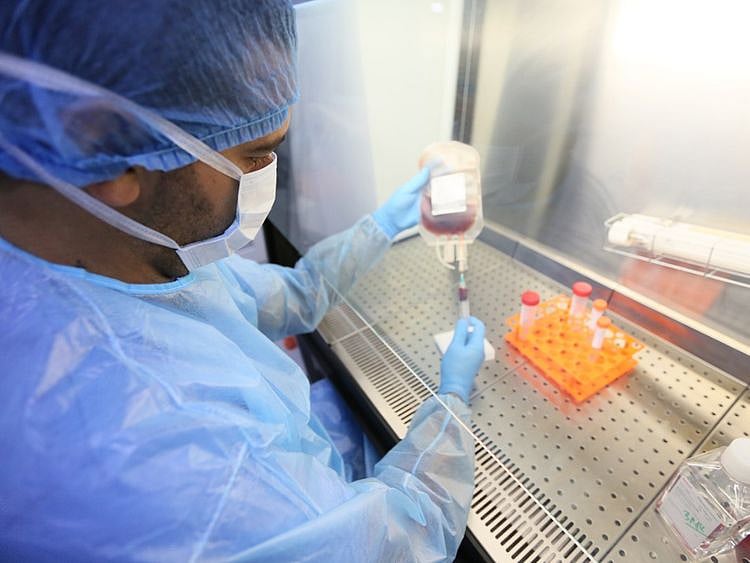UAE: Cancer patient in Abu Dhabi gets stem cells using new tech
The cells frozen at -196C can be preserved for 25 years, used in several doses over time

Abu Dhabi: In what is being billed as a first for Abu Dhabi, a 41-year-old patient suffering from lymphatic cancer has received a bone marrow transplant with the use of cryopreserved stem cells.
The patient, who was suffering from Hodgkin lymphoma, underwent the surgery at Burjeel Medical City, a private hospital under the VPS Healthcare network. The hospital said this is the first use of the technology in Abu Dhabi city.
The hospital carried out stem cell transplants for three patients suffering from multiple myeloma last year. In each case, the cells had been preserved for 48 hours before being re-infused to the patients.
Stem cells are raw primary cells available in the bone marrow, and they produce all types of blood cells, including red and white blood cells and platelets. Under the new technology, cells are frozen and preserved at a temperature of -196C. They can be preserved in this manner for up to 25 years, which enables patients to take several doses over time.
Why cryopreserve?
To enable the transplant under the novel procedure, stem cells are collected in advance and preserved. This makes way for high-dose chemotherapy to treat the cancer, then the stem cells are transplants into the patient so that they can regenerate the bone marrow. If the cells were not extracted, chemotherapy would deplete and destroy them.
Dr Humaid Al Shamsi, director of medical oncology at Burjeel Medical City, and president of the Emirates Oncology Society, said: “The success of stem cell transplantation after being frozen is an essential and important step in the right direction towards developing the bone marrow transplant sector in the UAE. The process enhances the ability to treat more cancer patients, especially leukaemia, within the country. In addition, without the need to travel abroad, it also strengthens the UAE’s position as a global destination for medical tourism.”
Dr Ahmed Al Rostamani, consultant and head of haematology at the hospital, said: “Freezing stem cells with liquefied nitrogen at sub-zero temperatures is one of the modern and advanced technical procedures used globally to preserve cells and use them in the future. This procedure is useful to be used in bone marrow transplant centres as part of the treatment in most cases of blood cancer and diseases, as it preserves stem cells for many years, whether from a donor or the patient themselves.
He added that Burjeel Medical City follows “the highest global standards to preserve the vitality of the cells” during and after freezing. The vitality of the cells is verified by accurate standards post-thawing and before use, to ensure the success of the subsequent medical procedure.
How it works
The autologous stem cell transplantation procedure takes four to six weeks, from the selection of the patient to discharge. The patient is examined to ensure that they are not infected with any infectious diseases. Drug-based methods are used to mobilise stem cells from the bone marrow and push them into the bloodstream to be collected. These methods include chemotherapy, treatment using white cell growth factor, and treatment with drugs to promote the release of cells from their place in the bone marrow and into the bloodstream. The cells are then processed at the stem cell lab for cryopreservation and storage.
There are currently several cases on the waitlist for bone marrow transplants in Burjeel Medical City, and it is expected that the patients will benefit from the freezing technique to be able to continue chemotherapy for the required period.
Sign up for the Daily Briefing
Get the latest news and updates straight to your inbox
Network Links
GN StoreDownload our app
© Al Nisr Publishing LLC 2026. All rights reserved.